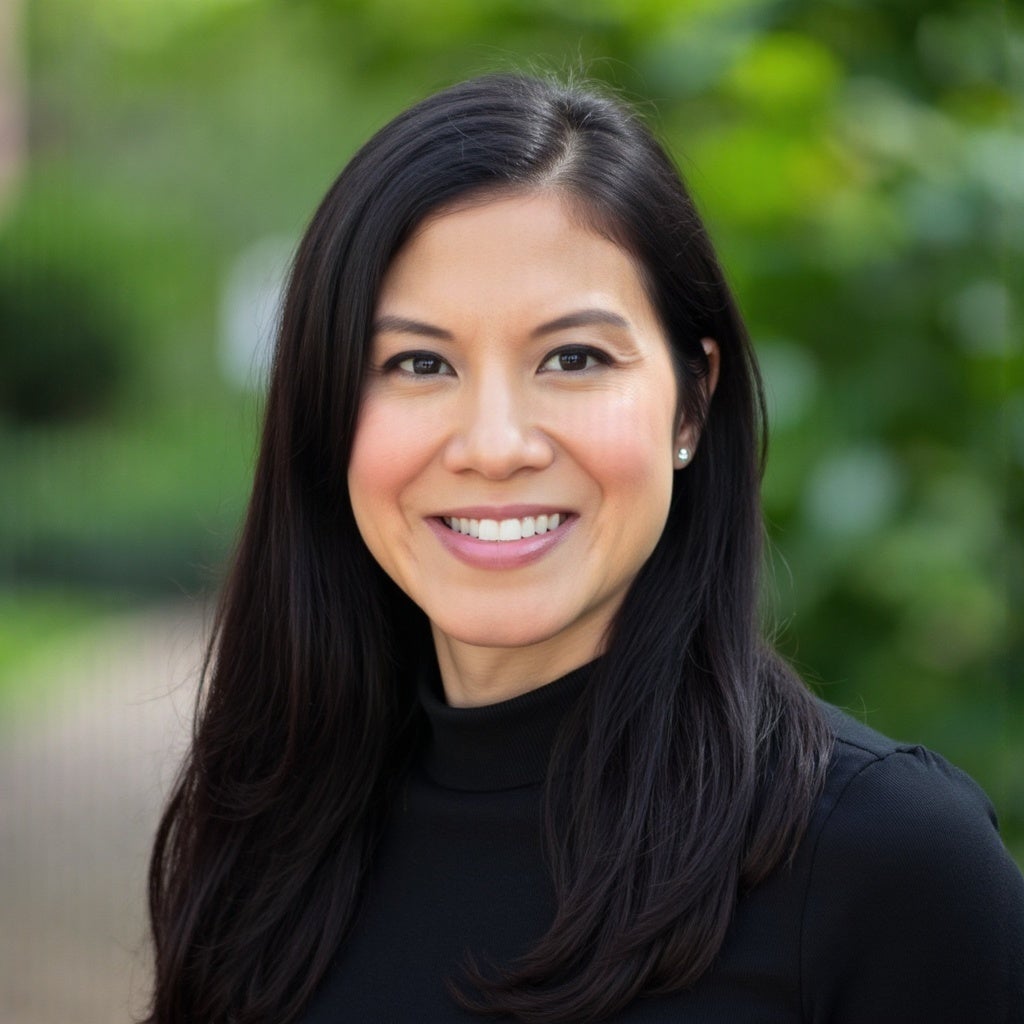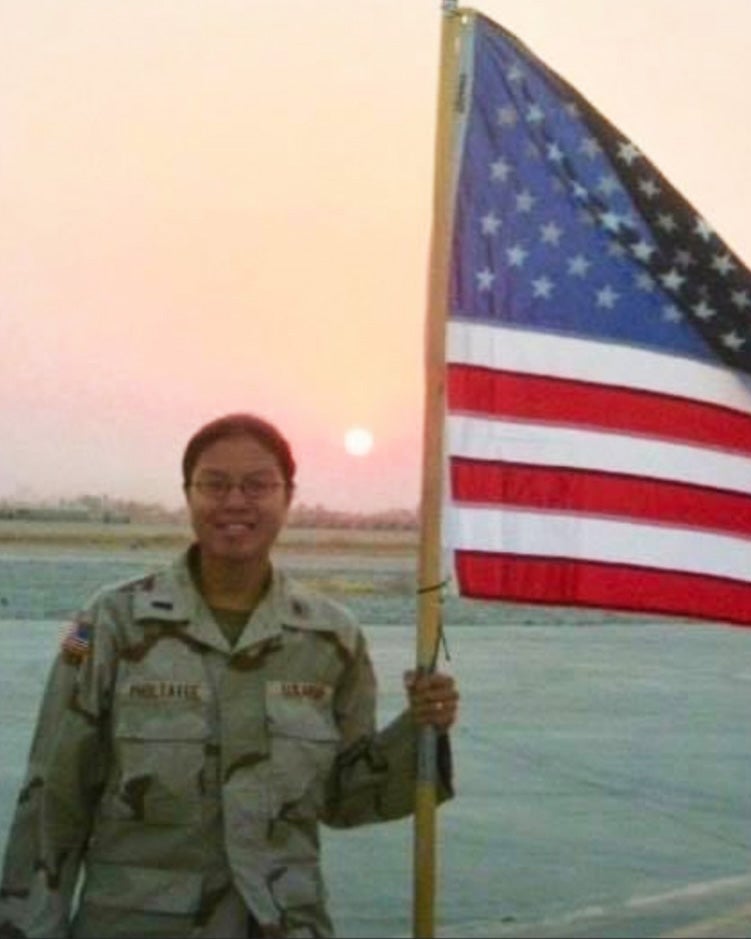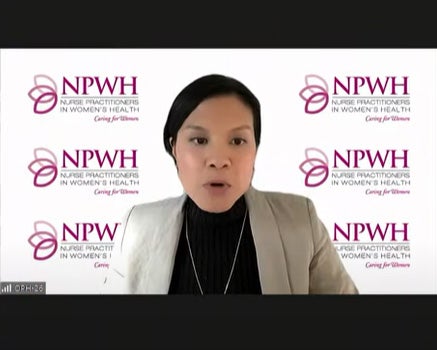Service and Scholarship: Paruchabutr’s Journey from Operation Iraqi Freedom to Georgetown

Kwuan Paruchabutr, DNP, FNP-BC, WHNP-BC, CNM
(November 8, 2024) — With over a decade of experience as an advanced practice nurse in the military health care system, Kwuan Paruchabutr, DNP, FNP-BC, WHNP-BC, CNM, managed her patient admissions and prescribed medications autonomously. Upon transitioning to civilian health care, she encountered an unexpected challenge: her autonomous practice did not automatically transfer — a barrier faced by advanced practice nurses nationwide.
“In certain states, nurse practitioners and other advanced practice nurses aren’t allowed to practice to the full extent of their training,” said Paruchabutr, assistant professor of nursing in Georgetown’s Women’s Health Nurse Practitioner (WHNP) and Nurse-Midwifery/WHNP programs. “This restriction limits our practice and our profession, and autonomous practice is something I’m very passionate about.”
As the first Asian American president of the National Association of Nurse Practitioners in Women’s Health (NPWH), representing over 13,000 WHNPs, Paruchabutr has consistently advocated for licensing reform and broader issues impacting nurse practitioners and their patients.
“My role involves a lot of advocacy on behalf of NPWH,” she said. “It’s been a major focus of my work with the organization.”
A Commitment to Service

Paruchabutr in Iraq
While many nurses begin their careers in hospitals, clinics or outpatient settings, Paruchabutr’s journey started in the Army Nurse Corps during Operation Iraqi Freedom.
“All of a sudden, we were going to war,” she said. “At only 23 years old, I was young, inexperienced, and a novice nurse facing this entirely new experience; but I learned quickly.”
After serving as a trauma nurse on active duty for six years, Paruchabutr continued her work as a trauma and critical care nurse in both the Army Reserves and civilian settings before deciding to specialize in women’s health. “I returned to school because I found myself drawn to women’s health,” she said.
Paruchabutr expressed profound gratitude for beginning her career as a combat trauma nurse. “I received a full four-year Army ROTC scholarship, which allowed me to enter the military as an Army officer,” she said. “I am beyond grateful for that opportunity.”
Advocating for Nurses and Patients
Through NPWH, Paruchabutr champions clinical guidance, research and high-quality continuing education for clinicians, including a dedicated clinical journal. “We set the scope of practice for WHNPs across the United States,” she said.
In her role as NPWH president, she has been a powerful advocate for both advanced practice nurses and patients. Paruchabutr led a team to submit an amicus brief to the Supreme Court, urging continued authorization for qualified non-physicians, including nurse practitioners, to independently prescribe mifepristone, a medication used in abortion and miscarriage management. In June, the court unanimously upheld this practice.
She also led a team in the submission of an amicus brief on behalf of NPWH in opposition to a Montana law that would have criminalized medication abortion provided by anyone other than physicians and physician assistants. For her advocacy, Paruchabutr was nominated and selected as a finalist for the Excellence in Advocacy Award by Women in Government Relations. In May 2023, the Montana Supreme Court struck down the law, affirming that advanced practice nurses and midwives could provide abortion care within their scope of practice
“Access to care is especially crucial in rural areas, where there are not enough providers,” Paruchabutr said. “I’m grateful to have played a role in expanding access.”
Paruchabutr has also advocated for her colleagues and patients by testifying in support of making oral contraception available without a prescription. “Countries around the world have been doing this for years, and given the state of reproductive health in the U.S., we need more contraceptive options,” she said.

Paruchabutr provided testimony on behalf of the NPWH via video to the FDA in support of making oral contraception available without a prescription.
Paruchabutr provided testimony at the FDA joint meeting of the advisory committees on non-prescription drugs and obstetrics, reproductive and urologic drugs in May 2023 and the Opill became the first daily oral contraceptive to receive FDA approval for use without a prescription in July 2023.
Noting that Opill is a progestin-only pill, Paruchabutr expressed optimism that patients will have more non-prescription contraception options in the future. “Next, we hope to see combined oral contraceptives become available without a prescription,” she said.
Overcoming Licensing Barriers to Improve Patient Access
NPWH advocates for full practice authority for advanced practice registered nurses (APRNs), ensuring WHNPs can practice to the full extent of their education and certification — a cause that became personal for Paruchabutr when she transitioned out of the military health care system.
Nurse practitioners are required to have a master’s degree in nursing, be licensed as a registered nurse (RN), graduate from a nationally accredited graduate nurse practitioner program, and pass a national nurse practitioner board certification exam. Despite nationally standardized requirements for education, program accreditation and board certification, the licensing requirements for nurse practitioners vary from state to state, creating challenges for practitioners, particularly military families who move frequently.
“It’s incredibly stressful to relocate and then have to navigate a new state’s licensing requirements,” Paruchabutr explained. “You’re trying to settle your family, and meanwhile, you’re researching the specific regulations in a new place.”
Expanding full practice authority across states would allow advanced practice nurses to work more effectively in underserved areas, improving access for patients who need care. “These barriers ultimately restrict access to the people who need it most,” she said.
The Power of the Mind
About a decade ago, Paruchabutr faced a series of personal challenges, including relocating to a new town with her three children, working full-time, coping with the passing of her mother, and managing life with a husband serving out military obligations in a different state.
“I felt like I couldn’t do it all,” she said. “I felt I was at an impasse and I couldn’t see the light at the end of the tunnel.”
To cope, Paruchabutr turned to meditation and mindfulness. “I’ve done a lot of self-reflection and become more conscious of my actions and words, while understanding the pressures I put upon myself,” she said. “This practice has truly transformed my life.”
Based on her experiences, Paruchabutr encourages her patients to explore meditative practices and mindfulness tools for improving their overall health. “I genuinely believe we haven’t fully tapped into the mind’s potential,” she said. “With the right approach, we can reshape our neural pathways and experience profound healing.”
“It affects health on every level — metabolic, spiritual and mental,” she added. “If we can help people heal from within, we can make a meaningful impact on the world.”
Kat Zambon
GUMC Communications
